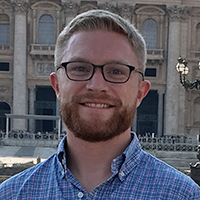Our US students reflect on the task facing a new Biden administration hoping to tackle COVID, climate change and inequality.
Back in November we asked our American students to react to the extraordinary 2020 US Election as it unfolded dramatically on the world stage. The weeks that followed proved to be equally tumultuous, as unfounded claims of election fraud were pursued, rhetoric escalated and America was stunned by scenes of insurrection at the heart of its democracy, all against the backdrop of a global pandemic. However, with Joe Biden and Kamala Harris sworn into office at the Inauguration on 20th January there is a sense that America can now begin to look forward. Once again, we ask our students to reflect on a pivotal moment and the task that lies ahead for a new administration hoping to unite a divided country and overcome some of the toughest challenges in its history.
 America stands at a crossroads, will it take the path towards unity?
America stands at a crossroads, will it take the path towards unity?
The first few weeks of 2021 have suggested this year will be as momentous as the one we just desperately clambered out of. Covid-19 cases are higher than ever in the United States and an angry mob descended upon the Capitol building, desecrating it with the presence of the Confederate flag—a feat insurrectionists never accomplished during the Civil War.
Unsurprisingly, the United States is at odds with itself when asked, once again, “Where do we go from here?” The debates about the issues at hand highlight the nation’s deepening cleavages. Was that an attempted coup incited by members of the government? Are accountability and justice needed for unity, or do they hinder the process? Do we want to investigate the events of January 6th, or is better to “move on”? It is time to rid our legislature of the Jim Crow era filibuster, or is it a crucial protection to the minority party? At the core of all of these—Who is an American?
The question of who we are and what we stand for must first be answered to successfully address the deafening cacophony that threatens to overwhelm us. A Reconstruction was embarked upon after the Civil War, but it was never finished. Consequently, the American identity was left unconsolidated. The opportunities that the Biden administration has within its grasp are as innumerable as the challenges it faces. The historian Barbara Tuchman once wrote, “When the gap between ideal and real becomes too wide, the system breaks down.” We, as a nation, have arrived at the cavernous gap described. Beyond the gap and its breakdown, renewal beckons and begs to be fulfilled. The question remains, however, if we will answer those summons—to become united for the first time.
Paige Anderholm is an MSc Conflict Studies student in the LSE Department of Government and voted in North Carolina. Her research interests focus on post-9/11 terrorism in the United States, specifically far-right and white supremacist motivated violence.
 The road of progress remains bumpy, but the way forward is brighter
The road of progress remains bumpy, but the way forward is brighter
When I was 16 years old, I served as a poll worker for the 2008 election, a job that offered a $100 check and a front row seat to democracy. Two months later, I stood on the National Mall in DC as nearly two million people jumped in unison to the song, “Shout”, in hopeful anticipation of Obama’s history-making oath of office to come.
In 2017, as President-elect Trump repeated that same oath, he extinguished the hope and the ideals many of us held so deeply. His deluge of disaster finally culminated in an attack on the Capitol itself, a building I worked in for three years. I walked those halls where Officer Goodman prevented insurrectionists from attacking, indulged on breakfast burritos in the cafeteria where National Guard troops slept protecting, and worked every day in awe of the building and institution it contained. That’s why January 6th was so violating. It trampled what my country, my colleagues, and myself held so sacred: our reverence for that hallowed place and the passionate but peaceful deliberation it represents.
The last several years exposed how divided we still are, how deep the scars of racial and economic inequality penetrate our conscious. Yet, Americans still come together around what Biden called, “that most elusive of things in a democracy: unity.” Citizens march to counter injustice against others, healthcare workers protect patients from a pervasive pandemic, and neighbors continue to comfort each other when we grieve. America will continue to rise and fall along the bumpy road of progress, but we know our path is clearer, the way forward brighter, when we ignite the lights of those around us so we may step forward more confidently, together, into the unknown.
And as American Youth Poet Laureate Amanda Gorman proclaimed:
“For there is always light,
if only we’re brave enough to see it.
If only we’re brave enough to be it.”
Ben Grazda is pursuing an MSc in Conflict Studies in the LSE Department of Government. He spent the last four years working for humanitarian organisations in the Middle East and sub-Saharan Africa, and before that he worked at the United States Senate for three years.
 The divide that Biden hopes to bridge is deep
The divide that Biden hopes to bridge is deep
In the wake of a violent and polarizing Capitol riot, President Biden gave a poetic speech about unification as his inaugural address. His message can be summarized with his own statement, “We must end this uncivil war that pits red against blue, rural versus urban, conservative versus liberal.” Although beautiful in both sentiment and spirit, such a task is not so easily accomplished.
In terms of partisan divide, the scars of distrust are especially apparent in the proliferation of election fraud claims. According to one poll, only 29% of republicans felt that Biden rightfully won the election and 68% are concerned that the election had been rigged. This statistic is not only staggering due to its implications of a deep partisan mistrust, but also due to its potential ramifications for the cornerstone of American democracy. Regardless of party alliance, fair elections and the peaceful transition of power enable citizens to believe that their political beliefs can be reflected in the next election cycle, which enables the democratic process to continue. However, if citizens begin to lose faith in the democratic process, their belief that they are being disregarded will only be exacerbated.
Republican-leaning rural communities have long felt abandoned by politicians, a problem once again proven credible by the fact that they have largely been left behind during the COVID-19 crisis. Moreover, both Republicans and Democrats feel as though the opposing party does not understand them, with only 13% of Biden and 5% of Trump supporters feeling that we are all more alike than different. This hesitance to value common ground is rooted in how the two parties fundamentally disagree on core American values. These issues illustrate how deep the divide truly is that Biden is hoping to bridge. Although symbolically necessary in order to signal the beginning of a less divisive presidency and inspire hope, Biden’s speech underestimates how difficult it will be to envision and secure unity.
Mary Angela Ricotta is a student in MSc Conflict Studies in the LSE Department of Government and graduated from Kenyon College in the US in 2020 with a degree in Political Science. Her research focuses include literature of the Middle East and North Africa, humanitarian work in relation to refugees, and international human rights law.
Note: this article gives the views of the authors, and not the position of the LSE Department of Government, nor of the London School of Economics.





